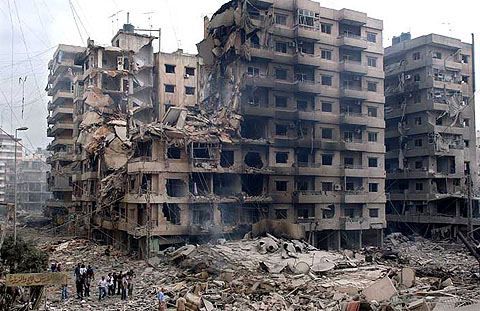SOURCE: JUAN WILSON juanwilson@mac.com
POSTED: 13 November 2006 - 6:30pm HST
Democrats
oversee suburban collapse

Beirut, Lebanon has tasted sudden economic collapse as recenty
as this year
| by
James Kunstler on November 13, 2006 on www.kunstler.com The day after the impressive Democratic election victory, Senate Majority Leader-to-Be Harry Reid declared that a top priority for the new congress would be policy leading to "energy independence" for America. The time of jubilee will certainly come, but not in the way Harry Reid thinks it will -- nor in the way the rest of the country imagines this idea. When politicians flog the term around -- "energy independence" -- they invariably mean that we will continue enjoying the happy motoring utopia by other means than imported oil (which makes up 70 percent of all the oil we burn). Get this: the day is not far off when, for one reason or another, the flow of imported oil to the US will cease. But when that day comes, we will not be running our shit the way we have been running it. That day will be the end of the interstate highways, Walt Disney World, and WalMart -- in short, the way of life we are fond of calling "non-negotiable." We are not going to run that shit on coal liquids or tar sand byproducts or oil shale distillates or ethanol or biodiesel, or second-hand french-fry oil. Nor on solar, wind, nuclear, or hydrogen. You can run things on that stuff, but not the biggies we run at their current scale. If the Democrats really want to get serious and act responsibly, they'd better not squander whatever is left of our credit and collective confidence in a futile campaign to keep this racket going. They'd better prepare the public to start living differently. Where to begin? They can start by recognizing that massive long-haul trucking of goods has to end and be replaced by improved, electrified rail plus water transport -- with trucks used only for the final, local leg of the journey. To reach this point of recognition, the Democrats will have to overcome the entrenched interests of the trucking industry -- but, by now, most of the truck drivers in this country have been successfully converted into right-wing Republican zombies, so it might not be so difficult to overcome them. They will also have to overcome WalMart and its "warehouse on wheels" composed of thousands of 18-wheelers full of discount goodies incessantly in motion for "just-in-time" delivery to the big box outlets. And, of course, by "WalMart" I mean not only the company itself but the millions of Americans who think they can't live without it. Do the Democrats have the guts to go against this tide? My guess is probably not. But, get this, too: sooner rather than later, whether we like it or not, we're going to have to replace WalMart with an entirely different system for retail trade -- probably resembling the system of multi-layered local trade networks that were destroyed by WalMart. And the further off we put this task, the more difficult it's going to be. So, real political leadership will have to inform the public that the time has come to start making other arrangements. Instead of supporting the fiction that happy motoring can continue forever, the Democrats should create an "Apollo Project" to restore the US passenger rail system, too. (We hear a lot about an "Apollo Project" to develop a miracle fuel for our cars, but that ain't gonna happen and we'd be much better off devoting that investment to public transit.) This will baffle and piss off a lot of the public, but it is necessary if we are going to survive as an advanced civilization. Please notice, by the way, that I am not suggesting we deprive anyone of the right to drive a car, only give them the option of getting somewhere by train instead. And don't worry, the politicians will not have to do a thing to restrict automobile use -- circumstances will do it for them as the world plunges into a permanent oil crisis that does not go away. Another thing the Democrats can do with their new power is reorient the activities of the US Department of Agriculture -- and especially legislated cash subsidies -- away from the "agribusiness" Big Boys to small-scale, local farmers. We are silently and stealthily approaching a crisis situation with the American food supply. Most localities now only have a two or three-day food supply, and any number of crisis events in the offing could disrupt the three-thousand mile chains of frozen pizzas and Cheez Doodles that the public depends on for basic sustenance. We desperately need to reactivate what's left of the productive land around our towns and cities, and to repopulate it with people who can grow real food. The Democrats will have to contend with the imminent cratering of suburbia whether they like it or not. The "housing bubble" is the first leg down for a development pattern that has no future. What's out there now is a vast over-supply of exactly the kind of houses in the kinds of places that will not have value in an energy-scarcer world. The overbuilding of tract houses is a tragedy caused by reckless and irresponsible behavior in the lending industry and in the government officials who regulate interest rates and the credit supply. The investments are already lost, and the individual carnage is going to be extreme, but the depth of the problem will reveal itself slowly for two reasons: 1.) both homeowners and realtors will desperately try to maintain the fiction that these properties still have high value, and 2.) individuals who are in trouble with their mortgage payments will never reveal their dire situation to their friends and neighbors because it is too humiliating. The news about default and re-po will only arrive with the moving vans (if the individuals can afford to hire them). The collapse of suburbia will be the Democrats chief inheritance from the "free-market" economically neo-liberal Republicans who were too busy money grubbing at all levels to notice that there was such a thing as the future. The tragedy of suburbia will finish off whatever is left of Reagan-Bush1-Bush2 Republicanism -- although the truth is that Bill Clinton did as much to promote this way of life, indeed, to turn suburban development into a new basis for the US economy when manufacturing crapped out. The nation as a whole -- however it reconfigures itself politically in the aftermath of this fiasco -- is going to have to come to grips with a lot of hard truths. One will be that "energy independence" means a whole different scale and system for daily life, not just "new and innovative" fuels for cars. As long as we are stuck in a foolish national wish-fest aimed at keeping all the cars running and propping up all the trappings of car-dependency, we will remain lost in a wilderness of our own making. And whoever the next president of the US turns out to be, whether a Democrat or the leader of a party that has not yet coalesced, will have all that he-or-she can do to keep this nation from completely falling to pieces. |
SOURCE: JUAN WILSON juanwilson@mac.com
POSTED: 9 October 2006 - 6:30pm HST
We are on top of the Peak

an Australian"truck-train"
of BP oil pulled by a Volvo tractor
Oh
Six End
days No more
increasing capacity = peak oil." |
see also:
Island
Breath: Progressivism Past & Present
Island
Breath:Disassembling America
Island
Breath: Calm Before the Storm
Island
Breath: Take a good look at America
Island
Breath: Sunken Ship of Empire
Island
Breath: Petro-Collapse
